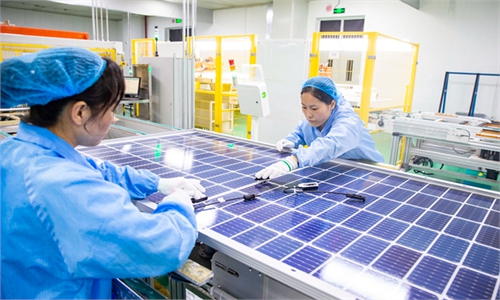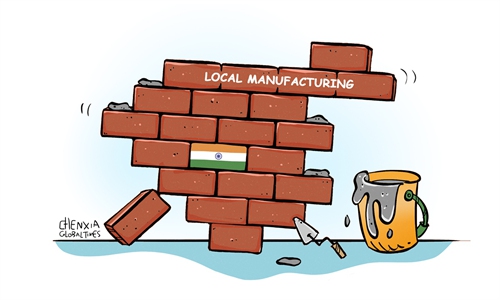India's unscrupulous suppression of Chinese firms to harm its own industrial development: experts
South Asian country becoming 'graveyard for foreign companies' with endless crackdown: experts

Customers are seen inside a VIVO mobile phone store in New Delhi on August 27, 2019. Photo: VCG
India has intensified its crackdown on Chinese companies, by arresting three senior employees working for Chinese smartphone maker Vivo's India unit. Chinese observers blasted India's unscrupulous move, saying that endless crackdowns on Chinese companies underscore the view that India is becoming a "graveyard for foreign companies."
Industry insiders and observers said that India's repeated investigations and massive penalties have imposed a heavy burden on Chinese companies and seriously punctured their confidence in future investment and operations in the South Asian country. They said that Chinese companies are unlikely to return to the market on a large scale in the short term.
The Directorate of Enforcement of India has arrested three senior employees of Vivo's India unit, including the interim CEO and CFO and a consultant under the provisions of the Prevention of Money Laundering Act, Indian news agency PTI reported on Saturday.
The arrests came two months after the Enforcement Directorate arrested a Vivo employee and three others in a case of alleged money laundering, charges that the company has denied.
"The unfair and discriminatory treatment of Chinese companies operating in India reflects that the Indian side keeps politicizing economic issues," Qian Feng, director of the research department at the National Strategy Institute at Tsinghua University, told the Global Times on Sunday.
India's endless crackdowns on Chinese enterprises will only end up undermining bilateral economic and trade cooperation while underscoring the international view that India is becoming a "graveyard for foreign companies," Qian said, noting that India itself will be the biggest victim of its deteriorating business environment.
"By sanctioning Chinese companies, India aims to kick down the ladder," Lou Chunhao, executive director of the Institute of South Asian Studies at the China Institutes of Contemporary International Relations, told the Global Times on Sunday.
Some world-class companies like Apple have started to assemble smartphones in India, which makes India believe that the development of its phone manufacturing industry has matured. Hence, India aims to sanction and exclude Chinese companies with groundless excuses so as to independently develop its smartphone manufacturing industry, Lou said.
India's continuous crackdown on Chinese companies is short-sighted, as the entry of Chinese smartphone producers makes a contribution to India's smartphone industry's development by increasing market competition and reducing costs, Lou said.
An India-based senior industry insider told the Global Times on Sunday on condition of anonymity that India's business culture increasingly showcases a zero-sum game mentality - where only India can win, and Chinese companies are not allowed to succeed.
While neglecting Chinese companies' contribution to the local economy - jobs, tax revenue and improved supply chains - India has imposed discriminatory sanctions on them, including routine financial and tax audits, fines and abrupt spikes in import tariffs, the insider said. He warned that India's practices place a heavy financial burden on Chinese businesses, and greatly dampen their confidence in investing and operating in India.
India has stepped up moves assaulting Chinese companies since 2020, such as banning more than 200 Chinese apps, launching so-called tax and anti-money laundering investigations into Chinese companies and heightening scrutiny of Chinese investments, Dai Yonghong, director of the Institute of Area and International Communication of Shenzhen University, told the Global Times on Sunday.
Playing geopolitical games with China is not affordable for India, Dai said, noting that unscrupulous crackdowns on Chinese companies will have sweeping negative impact on India's industries including electronics and information technology, component manufacturing, pharmaceuticals and even infrastructure.
India's unilateral and protectionist moves will also have a profound impact on China-India economic and trade ties, Dai said. "Although bilateral trade is still on the rise, the trend may not continue given India's 'small yard, high fence' approach, following in the steps of the US. Besides, Chinese companies have low confidence in investing in India and many hold a wait-and-see attitude about returning to India due to potential risks," Dai noted.
"Amid China-US tensions, India seeks closer ties with the US to attract more foreign capital to develop its manufacturing sector and compete with China in various aspects including industrial development and global governance," Lou said.
"However, the problem is whether the US is willing to support India or just make India a chess piece in containing China."
As the two largest developing countries in Asia, India and China should strengthen cooperation for win-win development, Lou said, adding that India should focus on development and solving domestic issues, rather than joining small circles that send the region off course toward fragmentation and bloc-based division.
"We support Chinese smartphone makers including Xiaomi and Vivo to protect their legitimate rights and interests through legal channels," Qian said, noting that China has countermeasures it can use if necessary.



